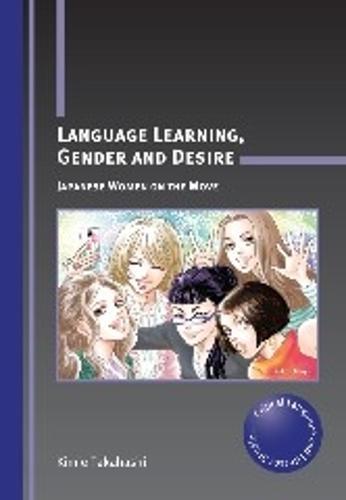Full Product Details
Author: Kimie Takahashi
Publisher: Channel View Publications Ltd
Imprint: Multilingual Matters
Volume: 16
Dimensions:
Width: 14.80cm
, Height: 1.70cm
, Length: 21.00cm
Weight: 0.369kg
ISBN: 9781847698544
ISBN 10: 1847698549
Pages: 200
Publication Date: 22 January 2013
Audience:
Professional and scholarly
,
Professional & Vocational
Format: Hardback
Publisher's Status: Active
Availability: Out of stock

The supplier is temporarily out of stock of this item. It will be ordered for you on backorder and shipped when it becomes available.
Reviews
Kimie Takahashi's investigation of the desires that lead Japanese women to learn English interrogates and ultimately challenges all kinds of stereotypes - Asian and Western, racial and sexual, cultural and linguistic. Original and thought-provoking, this book opens up important questions about second language learning, and makes a novel contribution to ongoing discussions of language, identity and difference. -- Deborah Cameron, University of Oxford, UK Language Learning, Gender and Desire is not just another scholarly monograph. It is refreshingly novel, for it treats a subject that until recently was taboo in applied linguistics - language learners' love lives and sex lives. It is ground-breaking, for it reveals how the English teaching industry in Japan manipulates its female consumers and sells renai (relationship) English. It is paradigm-changing, for it moves us away from 'motivation' as a 'factor' and towards socially and discursively constructed 'language desire'. Last but not least, it is deeply personal and extremely engaging, making the journey of five Japanese women learning English in Australia an unputdownable read. -- Aneta Pavlenko, Temple University, USA Romance blossoms, hearts break, and lives change as Japanese women go troppo in the Antipodes and tell the author all about their dreams, adventures and experiences of learning English as a second language. This delightful book is the definitive answer to the question, 'Is the concept of desire useful to students of language?'. The ethnography is wacky, the analysis is insightful and the writing is engaging and crisp. An absolute must-read for everyone interested in language and desire, language and learning, and language and globalization. -- Don Kulick, University of Chicago, USA Takahashi's book is well written, engaging, and enlightening. It is unafraid of revealing truths about the effects of media, the real struggles of ELL learners in Australia, as well as the repercussions of being a woman who is deemed too independent in Japan. This book is a must for scholars of gender and media, ELL teachers, as well as migration researchers, and is even appealing for the curious casual reader who will find many thought-provoking issues within its pages. -- Herbeth L. Fondevilla, University of Tsukuba, Japan Journal and Proceedings of GALE 2014 Vol. 7 The book is a welcome addition to the field of language, gender and sexuality and is nevertheless accessible to those who are new to the field. It would be a valuable read for students, language teachers and researchers interested in second language learning/acquisition as well as language, gender and sexuality. -- Ayako Tominari, Ibaraki Christian University, Japan Journal of Language and Sexuality Vol. 3:2 (2014)
Kimie Takahashi's investigation of the desires that lead Japanese women to learn English interrogates and ultimately challenges all kinds of stereotypes - Asian and Western, racial and sexual, cultural and linguistic. Original and thought-provoking, this book opens up important questions about second language learning, and makes a novel contribution to ongoing discussions of language, identity and difference. Deborah Cameron, University of Oxford, UK Language Learning, Gender and Desire is not just another scholarly monograph. It is refreshingly novel, for it treats a subject that until recently was taboo in applied linguistics - language learners' love lives and sex lives. It is ground-breaking, for it reveals how English teaching industry in Japan manipulates its female consumers and sells renai (relationship) English. It is paradigm-changing, for it moves us away from 'motivation' as a 'factor' and towards socially and discursively constructed 'language desire'. Last but not least, it is deeply personal and extremely engaging, making the journey of five Japanese women learning English in Australia an unputdownable read. Aneta Pavlenko, Temple University, USA
Kimie Takahashi's investigation of the desires that lead Japanese women to learn English interrogates and ultimately challenges all kinds of stereotypes - Asian and Western, racial and sexual, cultural and linguistic. Original and thought-provoking, this book opens up important questions about second language learning, and makes a novel contribution to ongoing discussions of language, identity and difference.Deborah Cameron, University of Oxford, UKLanguage Learning, Gender and Desire is not just another scholarly monograph. It is refreshingly novel, for it treats a subject that until recently was taboo in applied linguistics - language learners' love lives and sex lives. It is ground-breaking, for it reveals how English teaching industry in Japan manipulates its female consumers and sells renai (relationship) English. It is paradigm-changing, for it moves us away from 'motivation' as a 'factor' and towards socially and discursively constructed 'language desire'. Last but not least, it is deeply personal and extremely engaging, making the journey of five Japanese women learning English in Australia an unputdownable read.Aneta Pavlenko, Temple University, USA
Author Information
Kimie Takahashi is Lecturer at the Graduate School of English at Assumption University of Thailand. Her research interests centre on gender, second language learning and social inclusion in the context of transmigration. She is co-founder of the sociolinguistics website Language on the Move (www.languageonthemove.org).




